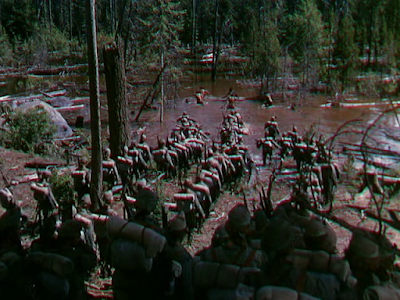It's 1759, during the French and Indian Wars (look it up) in North America, and young Langdon Towne (Robert Young) has come back to Portsmouth, New Hampshire from Harvard (after being expelled) to ask the hand of his sweetheart, Elizabeth Browne (Ruth Hussey). Bad timing. Beyond that, Dad Browne, a clergyman, thinks Towne's profession, an artist, is a poor prospect for his precious daughter, and Langdon, rebuffed, goes out and does what any young man would do under the circumstances—he goes out to the local pub and insults the local British constabulary...who just so happen to overhear him from the next room. With the help of "Hunk" Marriner (Walter Brennan), friend and fellow flagon-drainer, the two manage to get in a fight with the two red-coats (to avoid being arrested) and are soon on the lam.
On the lam to another bar, that is. If Mr. Browne thought Langdon was lousy husband material before, it's a good thing he isn't around to look down his nose at this. At that rustic pub, they meet Major Robert Rogers (Spencer Tracy) who treats the two fugitives to his favorite drink, "Flip," and tales of his explorations. The stories are very good, but the rum must be better, because the next morning they wake up at Fort Crown Point as recruits for Rogers' latest mission—to take on the Abenakis native tribe and stop the French at the town of St. Francis, the starting point for a lot of attacks on "civilized" settlements. Langdon's secondary mission, and apparent only usefulness, is to map the route for future expeditions...and posterity.
That is...if he survives. That trek is arduous, even without the man-made hazards along the way (director Vidor filmed in the wilds of Idaho), which are recounted in vivid excruciating detail. 142 men start on the mission, which starts out with the best of intentions and the best of planning, but Nature has a way of upending plans and what Nature doesn't delay, men and happenstance will.
After taking whaling boats up Lake Champlain, Rogers and troop hoofs it to make their way up to St. Francis, fully expecting to be able to meet up with the boats at the end of the expedition and fully expecting for their provisions to last the journey...with hunting being the fall-back. But rifle-fire will give away their position, so they have to make do with rationing what they have and what they haven't lost. Men are lost to attack and to injury, and rather than continue with the troop, slowing them down and leaving them vulnerable, they are merely left...to fend for themselves or die trying...or not trying.
It's a more dangerous version of The Lost Patrol, with the men gradually being picked off, moving forward even when they're convinced they have no chance of success, their return-boats and extra provisions stolen, and finally making it to St. Francis, where they stage an attack so intense and complete that they've become indistinguishable—in methods and ferocity—from the very people they've condemned as savages. There is no parsing for cause or motivation. It's just "kill 'em quick and kill 'em dead" where by flintlock, bayonet or tomahawk, and, just as with the men they've left behind, there's no time for funerals. If there's any message to be sent it's in the mutilated bodies and burning village.
But, that burning village is sure to be noticed from a distance. And with their left-behind provisions already taken and no food to be had except for dried corn in the village, the Rangers attempt to get to the closest fort, Fort Wentworth, and hope that they're met by re-enforcements and food. In the hope that they can find fishing and game, they head to Fort Wentworth by way of Lake Memphremagog, only to find they shouldn't tarry as there are signs that the French are nearby. Staggering behind them is Langdon, shot during the battle at St. Francis ("First thing I've had in my stomach for days...") and unwilling to be left behind.Leave it at that. The travails of Northwest Passage only get worse—and even plunge deep into the macabre as mutiny, insanity and cannibalism all work against Rogers' increasingly hollow "only a few miles left, men" optimism. "A Boys Own" adventure? Hardly. It is tough, unrelenting in its depiction and description of the hard-scrabble life and "take no prisoners" racial hatred in the early "civilized" days of the country. And despite its eye-popping photography, the expense of the location Technicolor work kept the movie from making a profit and cancelled any attempts to make a "Book 2." Still, an interesting, troubling, starkly surprising film that makes you amazed at what "they" got away with back in the studio days.































%5B00-53-24%5D.JPG)
-787784.png)



 Alvin Straight:
Alvin Straight:
 Straight:
Straight: Heller takes a swig.
Heller takes a swig.




 He takes another pull.
He takes another pull.




















 Straight:
Straight:















